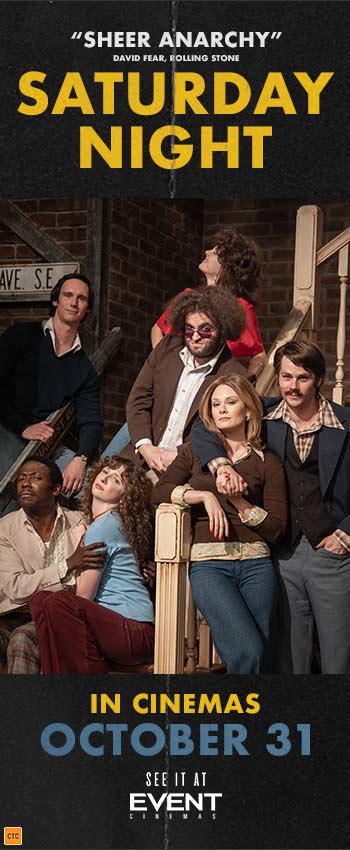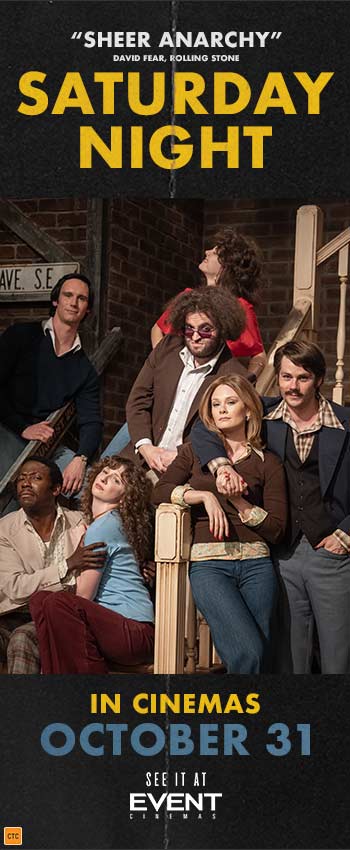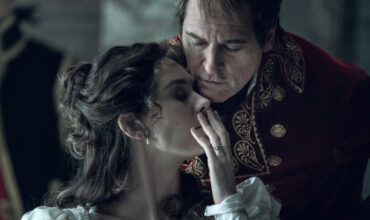Elvis Aaron Presley was an American singer whose music and influence made him an icon of the 20th Century. From 1956, when he sold 10 million singles for the RCA company in twelve months, until his untimely death in 1977 at the age of 42, Elvis was a global star. His effect on new music waned in the later 1960s, however his fame and his influence were intact until he died. He was dubbed The King of Rock and Roll and that is how many still see him.
Given his huge impact on our culture, there have been few dramatised movie accounts of Elvis Presley’s life. (There was a 1979 made-for-television movie ELVIS which was so successful domestically that it was recut for foreign release – Kurt Russell starred in the title role.) Now it’s time for Australia’s (and AUSTRALIA’S) film director Baz Luhrmann to step up to the plate.
Luhrmann and his writing team (Sam Bromell, Craig Pearce, Jeremy Doner) have chosen a storyline that jumps and zips in a non-linear fashion all through the King’s 42 years. The weirder choice is to place Elvis’s problematical mentor and manager Colonel Tom Parker (Tom Hanks) at the centre of the storytelling. The idea being pushed here is that Elvis would not have had the career he did, were it not for the controlling and manipulative Parker. It’s the idea the movie kicks off with and ends with and although Parker’s role in Elvis’s career is absolutely crucial, we lose sight of the man and that effect during a number of sequences.
What we do have are Hyper-Luhrmannised sequences of infant and adult Elvis. There’s a section showing young Elvis at a gospel revival meeting; a lone white boy amongst a black audience, receiving the word of God. Later we see Elvis at an early gig, and this is presented with minutely-judged editing, digital pushes in and out, speeding up, slowing down. It is accompanied by a similarly affected, loud, loud soundtrack. This combines to give us here in 2022 some idea of what it might have been like to see this young singer in 1955. The impact and the excitement is delivered with impact. American actor Austin Butler does a brilliant job embodying the King’s moves. He also sings the young Elvis sequences. (His voice is combined with the actual Elvis for the star’s later years.)
As the film reminds us, Elvis broke the “color barrier” by taking elements of black music, which were considered unacceptable by the white music industry, and included them in his songs. Whether this was a tribute or theft has been argued many times over the last 60 years, but Luhrmann presents this purely as Elvis being in love with the music and not being restricted by other people’s issues with race. There are key scenes where we see him wowing the audience and these remind us that what he did was ground-breaking musically, socially and sexually. Tom Parker saw this and understood that this potentially meant big business and so went all in to sign-up this unusual young talent.
Luhrmann’s dazzling presentation is supported by excellent costume, production design, set-building and top-notch computer-generated imagery that creates Memphis locations like Beale Street with a convincing eye for detail. The music is another story. The early stuff is futzed with and presented in a variety of ways, almost as though Team Luhrmann were afraid a modern audience of buyers wouldn’t go for hearing the music as it was. Overall, as in other Luhrmann movies, there is an impressive range of current musicians doing covers, remixes and mashups of the old material (Doja Cat, Kacey Musgraves, Tame Impala and Jack White are some of the contributors). Thirty plus tracks will be out there for music lovers to purchase.
As in any biographical picture, the accuracy varies. We are given some idea of the amount of sex and drugs that went with the rock and roll, but it seems light on. There are obviously moments that are composites of actual events. There is a scene where Elvis is at Club Handy with BB King and they are watching Little Richard. Did things actually unfold this way? Hard to say, but it is absolutely correct to remind us that Little Richard was figuratively burning down the house, at exactly the same time Elvis was. And Alton Mason’s performance of Little Richard is an absolute show-stopper.
What the film is lightest on is giving us who the main characters are. We don’t get to know what motivates Elvis or Tom Parker. Nor do we learn too much about his mother Gladys (Helen Thomas), father Vernon (Richard Roxburgh) or his wife Priscilla (Olivia DeJonge). The performances are fine. Tom Hanks has been weirdly criticised by some. I thought his makeup was brilliant and his performance is by turns bullying, cheer-leading, kind and greedy.
The actual Priscilla Presley, her daughter Lisa Marie Presley and her grand-daughter Riley Keough gave the movie a thumbs up, so who are we to argue with three generations of Presleys? This wasn’t necessarily a given. The real families involved in biopics are often quite negative about the results.
Overall, there are brilliant parts well-worth seeing and it eventually leads to a moving ending. There were things I disagreed with (see above) but at its conclusion, I was reminded that I was indeed a fan of this controversial, charismatic figure.
Fans of Elvis and fans of Baz Luhrmann’s filmmaking are likely to enjoy this. The preview audience that I saw it with, applauded at the end. Perth audiences don’t do this often.
Running Time:159 minutes. Rating: 6.5/10
We also have interviews with Olivia DeJonge who played Priscilla and Producer/Production Designer/Costume Designer Catherine Martin – Hit the links to take a look.






